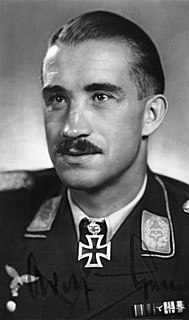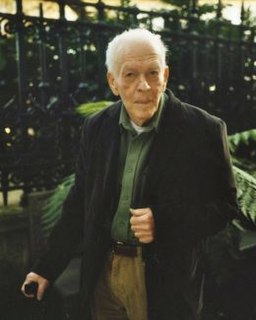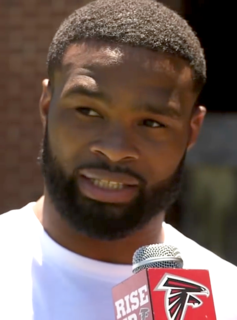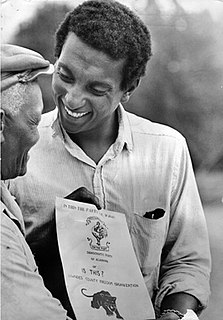A Quote by Adolf Galland
The first rule of all air combat is to see the opponent first. Like the hunter who stalks his prey and maneuvers himself unnoticed into the most favourable position for the kill, the fighter in the opening of a dogfight must detect the opponent as early as possible in order to attain a superior position for the attack.
Related Quotes
Knowing your opponent is a crucial part of emulating and defeating that opponent. But scouting is only the first step. Too many leaders spend countless hours studying an opponent's every move in the search for an edge. The Great Teams understand not only how to scout but also how to exploit the weaknesses of a competitor. These teams analyze every perspective and option and position themselves to take full advantage of any knowledge gained about an opponent.
Nonviolent action involves opposing the opponent's power, including his police and military capacity, not with the weapons chosen by him but by quite different means. Repression by the opponent is used against his own power position in a kind of political "ju-jitsu" and the very sources of his power thus reduced or removed, with the result that his political and military position is seriously weakened or destroyed.
As Abraham Lincoln said, if there is to be a superior position, he would rather that superior position be assigned to the White race. That superior position must be protected by those who believe in White supremacy and they will do everything in their power to make sure that that position will always be throughout the generations.
My goal is to go out there and dominate. We all know if I'm in a position and I see my opponent hurt by landing good striking, I'm going to try to get him out of there. If I'm in the top position or in the position to finish by submission, I'm going to look for that. I don't feel the need to prove the haters wrong.
It is true to say that the first kill can influence the whole future career of a fighter pilot. Many to whom the first victory over the opponent has been long denied either by unfortunate circumstances or by bad luck can suffer from frustration or develop complexes they may never rid themselves of again.
When Alekhine recognizes the weakness in his position he has a tendency to become very aggressive. Patient defence is not for him if he can see the slightest chance of creating an attack. Yet sound strategy often demands that you submit to the opponent's will so as to strengthen your weaknesses and get rid of defects in your game.
Men do not rest content with parrying the attacks of a superior, but often strike the first blow to prevent the attack being made. And we cannot fix the exact point at which our empire shall stop; we have reached a position in which we must not be content with retaining but must scheme to extend it, for, if we cease to rule others, we are in danger of being ruled ourselves. Nor can you look at inaction from the same point of view as others, unless you are prepared to change your habits and make them like theirs.
In executing an Artful Strategy: When ten times greater, surround them; When five times greater, attack them; When two times greater, scatter them. If the opponent is ready to challenge: When fewer in number, be ready to evade them; When unequal to the match, be ready to avoid them. Even when the smaller opponents have a strong position, the larger opponent will capture them.




































